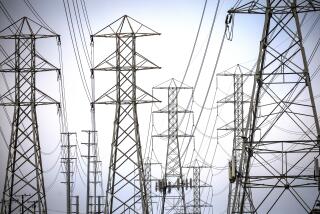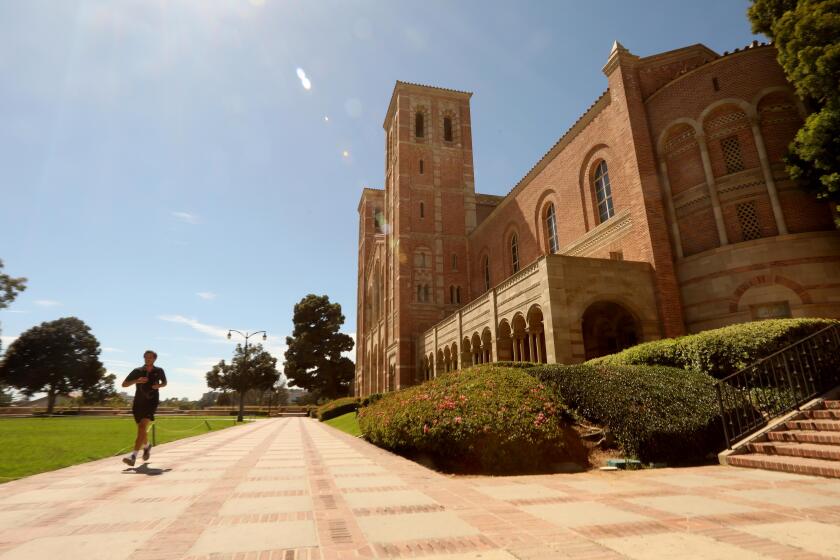Edison, SDG&E; Merger Is Opposed by PUC Staff
The state Public Utilities Commission’s staff on Thursday recommended against Southern California Edison’s proposed merger with San Diego Gas & Electric, saying it would not produce long-term benefits for utility customers.
The PUC’s Division of Ratepayer Advocates charged in a report that, as structured, the merger would not guarantee lower rates for customers after 1993. The report also said the merger would worsen Southern California’s air quality and cause severe antitrust problems.
“Our analysis shows that the benefits are smaller and less certain to materialize than the applicants have claimed,” division Director Terry L. Murray said in the report issued in San Francisco. “DRA urges the commission to reject the merger unless the applicants amend their proposal to make it beneficial to California ratepayers.”
The PUC’s five commissioners will use the report--along with thousands of documents generated by the utilities and dozens of other interested parties--when they decide whether to approve the proposed $2.5-billion merger and create the nation’s largest utility, with 4.8 million customers.
In April, the commission will hold public hearings on the merger throughout Southern California; it hopes to complete its review late this year.
Merger opponents described the DRA report as one more important barrier between the utilities and a completed merger.
“This report, coupled with (state Atty. Gen. John) Van de Kamp’s decision to oppose the merger, constitutes a one-two knockout punch,” said Michael Shames, executive director of Utility Consumers Action Network, a San Diego-based consumer group that is opposing the merger that Edison proposed in 1988. “We’ll never see this merger occur.”
Van de Kamp on Wednesday said he would oppose the merger because it violates antitrust laws and would damage air quality in Los Angeles.
Mayor Maureen O’Connor said the PUC staffers agreed with the city on the “key issues we have been arguing from day one. I think this is very, very significant, especially coming on the heels of the Attorney General getting involved.
“If they (the commissioners) overthrow (the recommendation), I mean I’ve got to tell you I don’t understand, because everybody who looks at it--except for the utilities--says it’s not a good deal,” O’Connor said.
But the utilities were “basically encouraged by the tone of the DRA report,” Edison spokesman Louis Phelps said. “They’re basically saying that they have concerns, and we’re saying that we think we can resolve those concerns.” Phelps maintained that the merger would produce $1.7 billion in savings that would be passed along to customers in the form of lower rates.
“We’re certainly willing to open the door and talk with DRA,” Bill Reed, SDG&E;’s regulatory affairs manager, said. “I think, bottom line, that they have confirmed that there’s a substantial level of benefits for our customers.”
State Sen. Herschel Rosenthal (D-Los Angeles), who last year suggested that the state needed to toughen regulations governing utility mergers, said Thursday that he is “not convinced that the guarantees for rate reductions were there. Without guarantees, they probably shouldn’t be doing the merger.”
The PUC staff based its report on an “independent forecast” that tracked the utilities’ claim that a merger would produce significant savings for utility customers by reducing operating, labor and fuel costs. The forecast suggested that customers would be better off without a merger because it could “result in slightly higher rates in the long-run.”
The PUC report also noted that while Edison and SDG&E; had guaranteed rate savings through 1993, “there is no mechanism to ensure that ratepayers will receive one cent of the savings after 1993.” Edison and SDG&E; have maintained that the bulk of the merger’s savings would accrue in the long-term.
On the complex question of antitrust issues, the report said that the merger would bolster Edison’s ability to buy bulk power from other utilities but create long-term problems for a handful of small, municipally owned utilities in Southern California that import electrical power through Edison’s impressive transmission grid.
“Based on what we know so far about DRA’s position on anti-competitive issues and access to the transmission system of the merged utilities . . . we believe these issues can be resolved,” Edison’s Phelps said.
But Edison “strongly disagrees” with the staff report’s demand that Edison sell its unregulated Mission Energy subsidiary, which is generating an increasing percentage of Edison’s net profit. The DRA and Edison have been feuding for more than a year over Edison’s “self-dealings” with Mission, a wholly owned company that generates electrical power for sale to utilities.
Larry O’Donnell, a businessman who formed a San Diego-based group that supports the proposed utility merger, described most of the PUC’s conditions as “bridgeable.” But O’Donnell said Edison is unlikely to sell Mission Energy.
O’Donnell also cautioned that the report is not the commission’s final word on the complex merger.
“The important thing to remember is that the DRA often stakes out a strong position which the commissioners often toss out,” O’Donnell said.
San Diego Deputy City Atty. William Shaffran, who has long represented the city in utility matters, doubted that Thursday’s seemingly negative report would dissuade Edison and SDG&E; from seeking to complete the merger.
“They’ll just plow on,” Shaffran said. “I wish I could foresee them quitting, but I just don’t see that. They’ll just keep on going and take their chances.”
More to Read
Sign up for Essential California
The most important California stories and recommendations in your inbox every morning.
You may occasionally receive promotional content from the Los Angeles Times.










